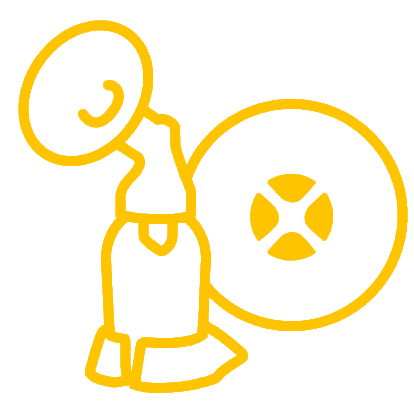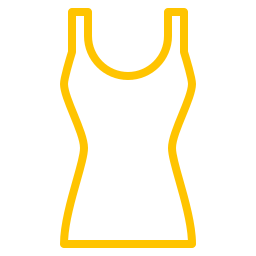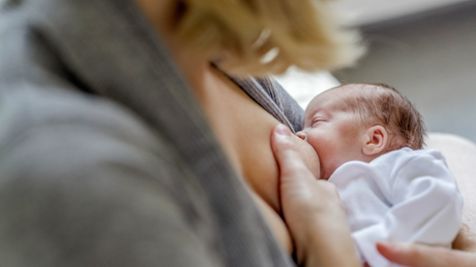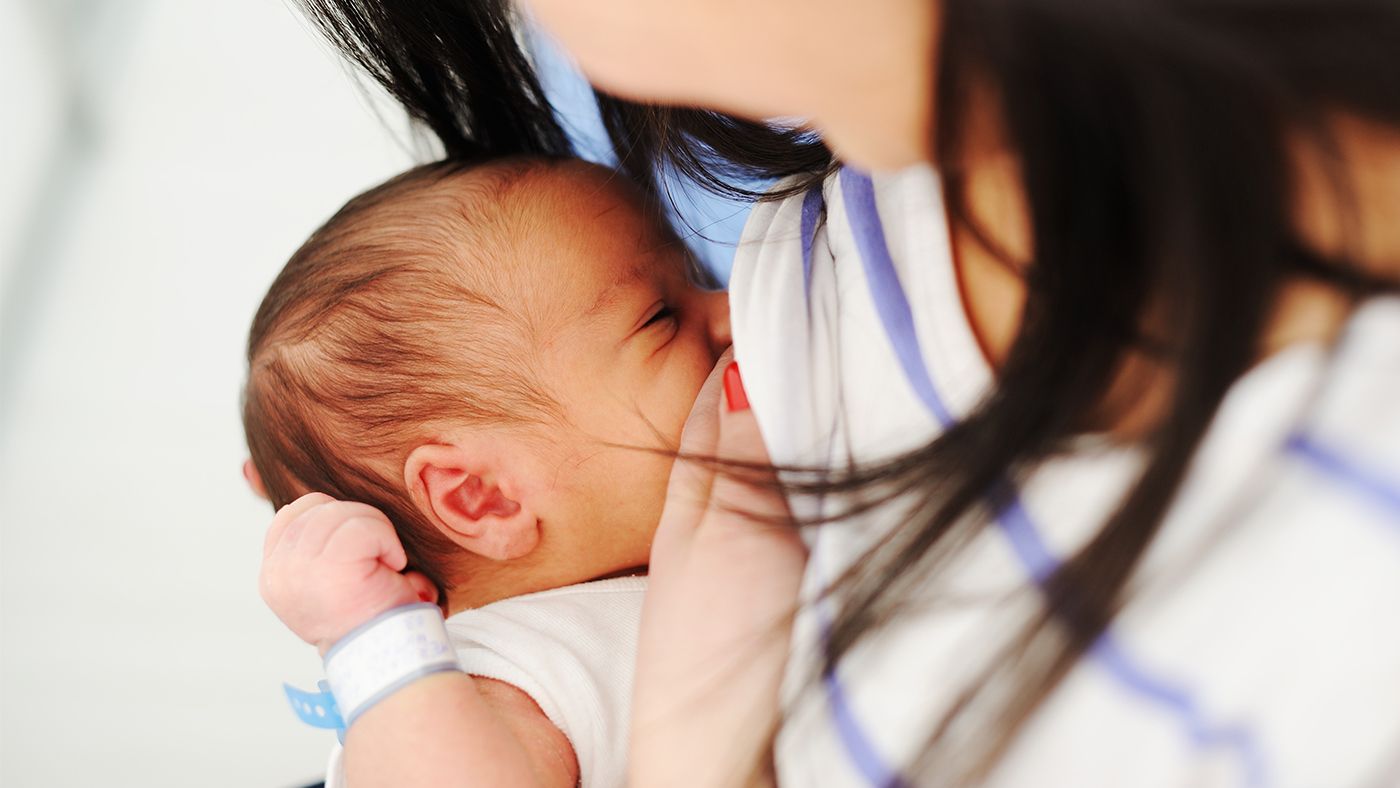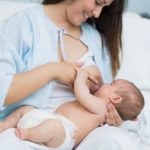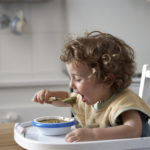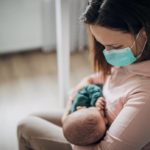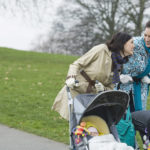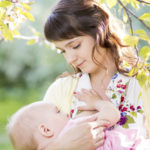-1.jpg)
Download the infographic on breastfeeding and pumping during COVID-19 as PDF.
1: Is it safe to breastfeed if I have confirmed or suspected COVID-19?
Yes, it is recommended that mothers who have confirmed or suspected COVID-19 continue breastfeeding or providing breast milk to their baby. Recent research has shown that mothers who have had COVID-19 pass on antibodies to their infant via their breast milk.
Steps to avoid spreading the virus to the baby include washing hands before holding the baby, and wearing a face mask when breastfeeding.
2: Is it safe to give expressed breast milk if I have confirmed or suspected COVID-19?
Yes, it is recommended that mothers who have confirmed or suspected COVID-19 and are giving their expressed milk to their baby continue to do so.
3: Is it safer to give formula if I have confirmed or suspected COVID-19?
No, UNICEF states that breastfeeding is the safest, most reliable method of infant feeding in an emergency.
Considering the benefits of breastfeeding and the current evidence of the small role that breast milk plays in the transmission of other respiratory viruses, as stated by UNICEF, the Academy of Breastfeeding Medicine, WHO and the CDC, it is advised that you continue breastfeeding.
4: Is it safe to still hold my baby in skin-to-skin contact if I have confirmed or suspected COVID-19?
Yes, it is recommended that even if a mother has suspected or confirmed COVID-19 her baby is kept with her in the same room on the maternity ward. Skin-to-skin contact is also encouraged as this helps with breastfeeding and breast milk production.
The American Academy of Pediatrics (AAP) issued guidance on July 22, 2020 regarding separation of mums and babies, based on the latest evidence.
As stated by UNICEF, the Academy of Breastfeeding Medicine, WHO and the CDC, if the mother and baby are able to remain together, breastfeeding at the breast is encouraged. Currently, the primary concern is not whether the virus can be transmitted through breast milk, but rather whether an infected mother can transmit the virus through respiratory droplets. Therefore, the CDC recommends the mother wear a mask and use good hand hygiene before and after breastfeeding.
5: Is pasteurised donor breast milk from a milk bank safe to be given to my baby in the NICU?
Yes, if a mother cannot breastfeed or does not have enough of her own milk, it is recommended that the first alternative should be pasteurised donor human milk (PDHM). Donor milk banks screen and test all mothers who donate milk. The breast milk is then pasteurised to additionally remove bacteria and viruses. COVID-19 virus has been shown to be destroyed by the standard pasteurisation techniques. PDHM is always considered a better choice than infant formula.
6: What should I do if I’m too unwell to breastfeed whilst I have COVID-19?
If you are too unwell to breastfeed, ideally you can express your milk and have another family member feed your breast milk to your baby whilst you get the rest you need to recover.
7: I have an underlying medical condition and have been advised to self isolate but am expressing for my NICU baby. What can I do?
The ABM recommends that prior to expressing breast milk, before touching any pump or bottle parts, you should wash your hands appropriately and take the necessary precautions, such as wearing a face mask for at least 5-7 days until cough and respiratory secretions are dramatically improved. After each pumping session, all parts that come into contact with breast milk should be thoroughly washed following the CDC recommendations for proper pump kit cleaning and the exterior of the entire pump should be properly disinfected using 70% ethanol or another disinfectant that is active against COVID-19.
Your hospital’s neonatal intensive care unit (NICU) may provide you with collection containers to express and store your expressed breast milk. Clean containers made of food-grade, BPA-free, hard plastic or glass are acceptable for the storage of human milk. Containers should have leak-proof lids. You should follow the breast milk storage guidelines for NICU and High Risk Infants (HMBANA) or those directed by your NICU. Follow your NICU’s guidelines for labelling your expressed milk.
Expressed breast milk should be refrigerated or frozen as soon as it is collected. Ensure collected milk remains at the either refrigerated or frozen state while transporting to the NICU. Place containers in an insulated container, appropriate for transport, with frozen gel packs. Frozen gel packs are more suitable than ice cubes to keep milk cold or frozen.
8: Is it safe to give my pumped milk to my unwell or preterm baby in the NICU if I have confirmed or suspected COVID-19?
Yes, according to the Academy of Breastfeeding Medicine, WHO and the CDC if you have COVID-19 and intend to breastfeed or provide milk to your baby, you are encouraged to express your milk to initiate, build and maintain your milk supply. UNICEF UK states that promotion, protection and support of breastfeeding should continue for all sick and preterm babies either in transitional or neonatal care. According to Professor Paula Meier and Associate Professor Aloka Patel, in the NICU, mother’s milk is even more important because it reduces the risk of all types of infections.
Recent research has shown specific benefits of providing breast milk relevant to the COVID-19 situation. Researchers in China, in USA and in the Netherlands antibodies against the new coronavirus in the milk of mothers who had previously had COVID-19, further supporting the recommendation to continue breastfeeding.
We recommend that you discuss with the hospital staff and follow your NICU’s specific recommendations and policies on milk expression, labelling, refrigerating or freezing breast milk and transporting it to the NICU.
9: Are COVID-19 antibodies passed via breast milk?
Research has shown that there are benefits of providing your breast milk during the COVID-19 pandemic. Researchers have found that antibodies against the current coronavirus are present in the milk of mothers who have previously had COVID-19 or who have received the COVID-19 vaccine.
COVID-19 vaccines are considered to be effective in breastfeeding mothers and pass on antibodies from their breast milk through to their baby. Therefore the WHO SAGE recommend that mothers who are vaccinated can continue to breastfeed.
10: If I have COVID-19 and am too unwell to breastfeed or have been separated from my baby for a period of time, can I restart breastfeeding?
If you have been separated from your baby for a period of time and breastfeeding has been interrupted, re-establishing lactation when you are together with your baby again is generally possible and worth trying even if a return to full breastfeeding is not always achievable. The UNICEF UK guidelines can help you to re-establish your milk supply and continue breastfeeding. This is called re-lactation.
UNICEF UK recommend the following essential measures for management of breastfeeding for re-lactation:
- Start actions to increase hormonal response, including plenty of skin-to-skin contact, nuzzling at the breast and breast massage.
- Breast massage and hand/pump expression (8-10 times in 24 hours) may help when separated from baby or in-between feeds
- The baby should suckle frequently from both breasts at least 8-12 times in 24 hours, at least 15 minutes on each breast. Consider night feeds.
- Try having the baby also at the breast while pumping.
- The baby should be well attached to the breast for effective suckling and to avoid nipple trauma. Monitor baby’s stool and urine output
- Contact an Infant Feeding Specialist to receive additional guidance and support to re-establish your milk production and control your baby’s growth.
11: Are vaccines safe while breastfeeding?
The WHO Strategic Advisory Group of Experts on Immunization (SAGE) interim recommendations state that if a breastfeeding mother is part of a high-risk group e.g. she’s a health worker or in a group recommended to have a vaccination, a vaccine can be offered.
Whilst research on COVID-19 vaccines did not include women who were breastfeeding, the absence of direct data does not mean the vaccines are not safe.
According to the CDC neither inactivated nor live-virus vaccines, like the AstraZeneca and Janssen vaccines, pose a risk for mothers who are breastfeeding or for their infants. (Except for smallpox and yellow fever vaccines – these are not given to lactating mothers).
The Pfizer–BioNTech and Moderna vaccines do not contain a live virus. The mRNA in these vaccines does not enter the core of the cell, and is degraded quickly. According to the CDC, the COVID-19 vaccines are thought not to be a risk to a child breastfeeding or receiving breast milk.
COVID-19 vaccines are considered to be effective in breastfeeding mothers and even pass on protection to the baby through breast milk.
Therefore the WHO SAGE guidance recommends that mothers who are vaccinated continue breastfeeding.
12: What are the storage guidelines for breast milk if I have COVID-19?
The Academy of Breastfeeding Medicine states that although it is still unknown whether mothers with COVID-19 can transmit the virus via breast milk, limited studies on breastfeeding women with COVID-19 and other coronavirus infections have not detected the virus in breast milk. From that perspective, you can follow the regular breast milk storage guidelines (ABM and HMBANA) as long as you wash your hands appropriately and take the necessary precautions, such as wearing a face mask.
If you have expressed breast milk cleanly and safely, you can store it at room temperature, in the fridge, or in the freezer, depending on how soon you want to use it.
|
Storage place |
Room temperature |
Refrigerator |
Freezer |
Previously frozen |
|
Safe storage time |
Up to four hours is best Up to six hours for milk expressed under very clean conditions* |
Up to three days is best Up to five days for milk expressed under very clean conditions* |
Up to six months is best Up to nine months for milk expressed under very clean conditions* |
Up to two hours at room temperature Up to 24 hours in the refrigerator Do not refreeze |
* Very clean conditions means rigorously following the guidance in article on cleaning and sanitising your breast pump and those of the CDC.These guidelines for storing and defrosting breast milk are a recommendation – contact your lactation consultant or breastfeeding specialist for further information.
If your baby is in a neonatal intensive care unit (NICU) or special care ward, your hospital may have stricter recommendations for cleaning and storage.
If you’re refrigerating or freezing expressed milk, always label the bottles or bags with the amount and the date it was pumped, so you can track and manage your stored milk.
13: Could I get COVID-19 from a contaminated rental pump?
Trained employees perform the cleaning and servicing of rental pumps. The pumps are cleaned with water and soap and then disinfected before they can be used by another mother. There are many disinfectants, including commonly used hospital disinfectants, that are active against enveloped viruses, like COVID-19. Currently WHO recommendations include the use of:
-
70% ethanol to disinfect reusable dedicated equipment (e.g., thermometers) between uses
- Sodium hypochlorite at 0.5% (equivalent 5000ppm) for disinfection of frequently touched surfaces in homes or healthcare facilities
Alcohol-based disinfectants are approved for the Symphony rental pump and have proven effective against COVID-19.
When using a breast pump to express breast milk, whether it is a rental pump or a store bought personal use pump, wash your hands before touching any pump or bottle parts and follow the CDC recommendations for proper pump kit cleaning after each use.
When it is time to return the Symphony pump to the rental station, please kindly disinfect the pump and the case using an alcohol-based disinfectant.
14: How is Medela rental equipment safely used when in isolation at home due to Coronavirus disease?
If you have rented a Symphony pump for use at home, please note that all pumps are cleaned with water and soap and then disinfected with commonly used disinfectants that are active against coronaviruses.
When using a breast pump to express breast milk, whether it is a rental pump or a store-bought personal use pump, wash your hands before touching any pump or bottle parts and follow the CDC recommendations for proper pump kit cleaning after each use. Recommendations encourage that someone who is not sick feed the expressed breast milk to the infant.
If you are returning a rental pump to the rental station, please kindly disinfect the pump and the case using an alcohol-based disinfectant.
15: How should I clean my pumping equipment if I have COVID-19?
When using a breast pump to express breast milk, wash your hands before touching any pump or bottle parts and follow the CDC recommendations for proper pump kit cleaning after each use. Recommendations encourage that someone who is not sick feed the expressed breast milk to the infant.
16: Does a dishwasher destroy the virus on my breast pump milk collection set?
When using a breast pump, always wash your hands before touching any pump or bottle parts and follow the CDC guidelines on sanitising pumps and pumping equipment after each use. A study has shown that detergents present in commonly available household cleaning agents like dishwashing liquid are able to inactivate COVID-19.
For extra germ removal, sanitise pump parts at least once daily after they have been cleaned. Items can be sanitised using steam, boiling water, or a dishwasher with a sanitise setting.
17: Does boiling pump accessories in water kill COVID-19?
While we still do not know much about COVID-19, most other viruses are believed to be deactivated at boiling temperatures. When using a breast pump, wash your hands before touching any pump or bottle parts after each use.
For extra germ removal, sanitise pump parts, wash basin, and bottle brush at least once daily after they have been cleaned. Items can be sanitised using steam, boiling water, or a dishwasher with a sanitise setting.
Disclaimer
The information and materials provided on this website does not, and is not intended to, constitute legal advice; instead, all information available on this site are for general informational purposes only. Information on this website may not constitute the most up-to-date information. Medela reserves the right to supplement this website at any time or to change or delete any information or materials on this website.
This website contains links to other third-party websites. Such links are only for the convenience of the reader, user or browser; Medela does not recommend or endorse the contents of the third-party sites.
The information and materials on this web site is provided “as is”; no representations are made that the content is error-free. Whilst we have tried to ensure the accuracy and completeness of the information and materials on this website, we do not warrant or guarantee the accurateness, completeness, adequacy or currency of the information and materials contained in or linked to this website.
All liability with respect to actions taken or not taken based on the content of this website are hereby expressly disclaimed. Your use of content contained in or linked to this website is entirely at your own risk. Medela accepts no liability for any loss or damage howsoever arising out of the use of this website or reliance on the content of this website.


